-

人教版新目标初中英语九年级下册You’re supposed to shake hands教案
教学目标:1. 掌握本单元一些重点词汇的写法和用法。2. 学会自如谈论餐桌礼仪。Step 1 RevisionAsk some students to retell the customs at the table in France in the passage in 3a.Step 2 Self checkPart 1. Fill in each bland with the correct word given. Students do the exercises by themselves at first. Then check the answers. Ask the students to comprehend the sentences and help them point out uses of some words, like “arrive (at / in) sw., spend time / money on sth , spend time / money (in) doing sth.”Part 2. Read about Fan Ling’s experience in a western restaurant. Understand the passage. Point out some key points in the passage.1. be / get used to doing sth. 习惯做某事2. begin with = start with 以….开头3. crowd v. 挤满,塞满 the crowd 人群 crowded adj. 拥挤的Then students discuss about how she would solve her problem. Ask some to share their stories with others.Part 3. Complete the crossword by looking at the sentences on the left. Then check the answers.

新人教版高中英语必修1Unit 1 Teenage Life-Listening and Speaking & Listening and Talking教案
Step 2 Listening and Talking1. The teacher is advised to talk with their new students about the related topic: Boys and girls, do you know some structures to talk about future activities? Talking about future activitiesWe’ll …I plan to …There’ll be …I hope to …We’re going to …2. After their small talk, the teacher can move on by playing the listening and solve the following task.Underline the expressions in the sentences below Cao Jing and Max use to talk about the future.We’ll learn useful skills.I plan to improve my spoken English.There’ll be students from different schools.I hope to make new friends.We’ll talk about teenage life.I’ll learn to make a fire.There’ll be students from different countries at the camp.There’ll be some experts there to show us how to live in the wild.We’re going to learn about wildlife.I’m going to give a speech.I think I’m going to enjoy the activities.I think we’ll have a lot of fun.3. Work in groups. Plan a youth camp.Teacher make the Ss think of ideas for the camp. And they can use the questions below to get started. And have the Ss present their ideas for a youth camp to the class.●What kind of camp is it?●Who will be there?●What will they do?●What will they learn?

新人教版高中英语必修1Unit 2 Travelling Around-Listening and Speaking & Listening and Talking教案
【教学目标与核心素养】1. Instruct students to get main facts by listening and motivate them to talk about the topics about how to prepare for the trip and make reservations by listening and ultimately can make travel arrangements and reservations. 2. Develop students’ sense of cooperative learning and individual thinking capability. 3. Develop students’ different listening skills to solve different listening comprehensive problems.4. Help students to understand how to use the structures “the present continuous tense (be doing) is used to express future plans.【教学重难点】1. Teach students how to focus on key words, not on single words or grammar.2. Prompt Ss to talk about the related topics, such as how to prepare for the trip and make a travel plan.【教学过程】Step 1: Listening and SpeakingLead inThe teacher is advised to talk with their students about the places that they want to travel most both at home and abroad: boys and girls, if you have a chance to travel around the world, where will you go? After their small talk, the teacher can move on by finishing the following listening task:Before travelling, what do we need to prepare for the trip?

新人教版高中英语必修1Unit 3 Sports and Fitness-Listening and Speaking & Listening and Talking教案
Finally, after finishing the task above, the teacher is expected to instruct students to work in groups to finish the following project:Speaking ProjectWhat event or activity would you like to invite your friend to? Make a conversation with a partner.Ski Race: Zhangjiakou, a beautiful city in northern China, will host the Youth Ski Race in December.Track Meet: a great event for track –and –field lovers on 26 October.Gym Class: come and work out at a gym! You can make it.Part 2: Listening and Talking:The teacher is advised to talk with their new students about the related topic: Boys and girls , what do you think of sportsmanship? Let’s listen and find out:Play the listening and match each opinion with the right speaker. Who do you agree with? Why?Cao Jing _____________ Lily _____________ Max _____________A. An athlete should do his/her best to win.B. The girl should stop and help the other girl. Good sportsmanship is more important than wining!C. An athlete should think about honor and his/her fans if he/she is competing for his/her country.Listen again and circle the expressions that you hear in the conversation.
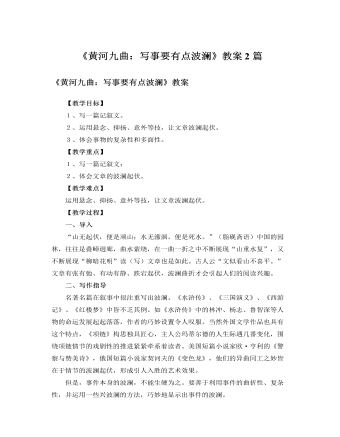
人教版高中语文必修1《黄河九曲:写事要有点波澜》教案2篇
1.悬念法悬念法又称关子。它是作者为了激发那种“紧张与期待的心理活动”,在行文中有意采取的一种积极而有效的手段。这种手段包括“设悬”和“解悬”两方面。所谓 “设悬”就是设置悬念,即在情节发生发展的关键时刻或人物命运攸关的重要关头,叙述戛然而止,转叙他事。从而引起读者强烈的寻根问底的兴趣。所谓“解悬” 也叫“释悬”,就是指在情节发展的特定阶段,通过矛盾的解决,揭示事情原委和人物命运的结局,使读者的期待心理得以满足。如《驿路梨花》,当人们正为露宿而发愁时出现了一间神秘的小屋,小屋的主人是谁呢?猜想间,有人来了,但也不是屋子主人,那小屋子的主人是谁呢?终于知道了小屋是解放军盖的,但为什么要盖这间小屋呢?这样“设悬——释悬——带出新悬念”,环环相扣、层层递进,使文章韵味无穷。
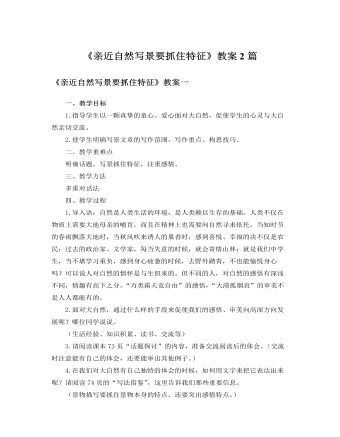
人教版高中语文必修2《亲近自然写景要抓住特征》教案2篇
一、教学目标1.指导学生以一颗真挚的童心、爱心面对大自然,促使学生的心灵与大自然亲切交流。2.使学生明确写景文章的写作范围、写作重点、构思技巧。二、教学重难点明确话题,写景抓住特征,注重感情。三、教学方法多重对话法四、教学过程1.导入语:自然是人类生活的环境,是人类赖以生存的基础。人类不仅在物质上需要大地母亲的哺育,而且在精神上也需要向自然寻求依托。当知时节的春雨飘落大地时,当秋风吹来诱人的果香时,感到喜悦、幸福的决不仅是农民;过去的政治家、文学家,每当失意的时候,就会寄情山林;就是我们中学生,当不堪学习重负,感到身心疲惫的时候,去野外踏青,不也能愉悦身心吗?可以说人对自然的情怀是与生俱来的。但不同的人,对自然的感悟有深浅不同,情趣有高下之分。“万类霜天竞自由”的感悟,“大漠孤烟直”的审美不是人人都能有的。2.面对大自然,通过什么样的手段来促使我们的感悟、审美向高深方向发展呢?哪位同学说说。
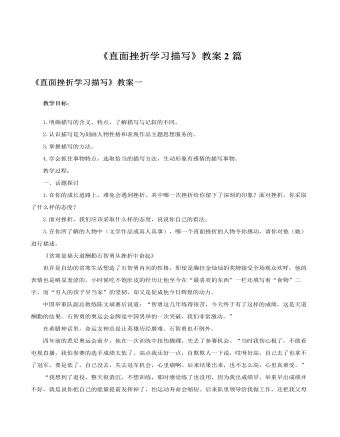
人教版高中语文必修2《直面挫折学习描写》教案2篇
《贫寒是福天道酬勤石智勇从挫折中奋起》也许是自幼的贫寒生活塑造了石智勇内向的性格,即使是胸挂金灿灿的奖牌接受全场观众欢呼,他的表情也是略显羞涩的。小时候吃不饱肚皮的经历让他至今在“最喜欢的东西”一栏还填写着“食物”二字,而“穷人的孩子早当家”的坚韧,却又是促成他今日辉煌的动力。中国举重队副总教练陈文斌赛后说道:“智勇这几年练得很苦,今天终于有了这样的成绩,这是天道酬勤的结果。石智勇的奥运会金牌是中国男举的一次突破,我们非常激动。”在希腊神话里,命运女神总是让英雄历经磨难。石智勇也不例外。四年前的悉尼奥运会前夕,他在一次训练中扭伤脚踝,失去了参赛机会。“当时我伤心极了,不敢看电视直播,我怕参赛的选手成绩太低了。高点我还好一点,自欺欺人一下说,哎呀好高,自己去了也拿不了冠军,要是低了,自己没去,失去冠军机会,心里痛啊。后来结果出来,也不怎么高,心里真难受。”
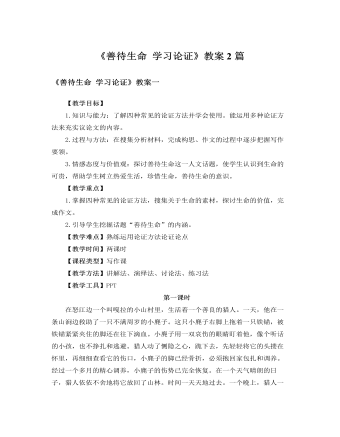
人教版高中语文必修3《善待生命 学习论证》教案2篇
论证方法之引证法如何用好引证法:1.所引用的名言警句等针对性要强。每句名言都产生于特定的背景,都应用于特定的交际目的,即使谈同一个问题,也有不少名言可供选取。2.要简洁,不宜过多。议论是在发表自己的见解而不是在介绍他人的见解。引用他人的话,目的是为了让读者更加信服自己的话。3.要注意直接引用和间接引用的区别。直接引用务求文字、甚至标点均准确无误;间接引用只须述其大意,但要注意人称的转换。论证方法之喻证法喻证法是用设喻来论证论点的方法。在议论文中,设喻可以使论点更易懂、更风趣、更容易获得读者的认同。喻证法能化抽象为具体、化艰深为浅显、化枯燥为生动。论证方法之喻证法如何用好喻证法:1.以小见大,就近取譬。要精选生活中细小的、人们熟悉的事物做为设喻的喻体。2.喻体不求形似,只求神似。做为喻证的喻体与做为比喻的喻体不同。比喻的喻体是为了强调特征,描绘事物,侧重形似,以形比形;而喻证的喻体是为了阐发观点,以正视听,力求神似,以义取形。

人教版新目标初中英语七年级上册Do you have a soccer ball教案
在这一单元中,学生要学会就有关人与物之间所属关系进行问答的句子。本单元大量引入有关运动的名词,要求学生彼此询问有无此类物品,并做出相应的回答。 同时学习表示建议的句型Let’s运动的形容词。 本单元所选用的话题来自学生所喜欢的生活片段,在教学中生生交流、师生交流会更融洽,会促进师生彼此间的了解,成功的教学还会让部分学生养成良好的运动习惯和收藏习惯。 教学目标 1) 语言知识:A.在询问对方是否有某物的对话中学会使用do和does引导的一般疑问句; B. 学会使用描述性的形容词来评价事物; C. 学会在对话中使用名词复数; D. 学会用祈使句来向对方提出建议. 2) 语言技能:A. 学会用祈使句询问某人是否有某物; B. 学会向他人提出建议的句子. 3) 学习策略:A.通过与同学讨论,做出猜测;
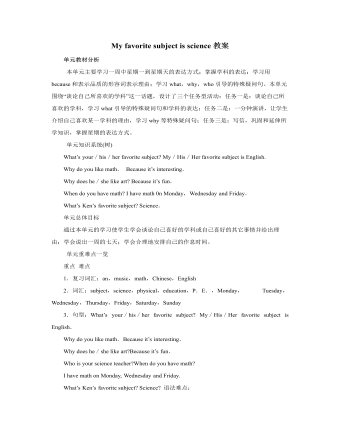
人教版新目标初中英语七年级上册My favorite subject is science教案
本单元主要学习一周中星期一到星期天的表达方式;掌握学科的表达;学习用because和表示品质的形容词表示理由;学习what,why,who引导的特殊疑问句。本单元围绕“谈论自己所喜欢的学科”这一话题,设计了三个任务型活动:任务一是:谈论自己所喜欢的学科,学习what引导的特殊疑问句和学科的表达;任务二是:一分钟演讲,让学生介绍自己喜欢某一学科的理由,学习why等特殊疑问句;任务三是:写信,巩固和延伸所学知识,掌握星期的表达方式。单元知识系统(树)What’s your/his/her favorite subject? My/His/Her favorite subject is English.Why do you like math. Because it’s interesting.Why does he/she like art? Because it’s fun.When do you have math? I have math 0n Monday,Wednesday and Friday.What’s Ken’s favorite subject? Science.单元总体目标通过本单元的学习使学生学会谈论自己喜好的学科或自己喜好的其它事情并给出理由;学会说出一周的七天;学会合理地安排自己的作息时间。
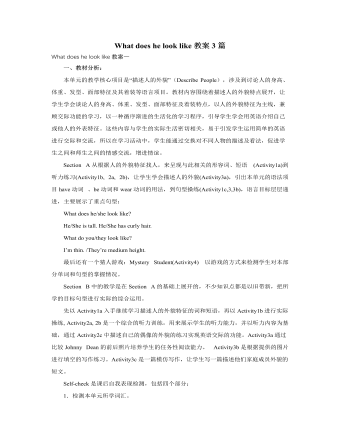
人教版新目标初中英语七年级下册What does he look like教案3篇
所需要用到的句子:Who is that?That is Jack. I like him.Why do you like him?I like him because he is interesting.Task 4: 设计理想中的人类Step one: 设计理想中的人类的外貌。把全班同学分成若干小组,学生可以边说边在纸上画出他们的模样。Step two: 设计理想中人类的性格。学生们可以把那些能描述性格的单词写在图画的旁边。Step three: 每组选出一名同学,其他同组同学提问,他作简单回答,并说明原因。所需用到的句子:What does he or she look like?He or she ...What is he or she like?He or she is ...Why?Because ...Task 5: 挑战性活动调查性格是天生的还是后天形成的,让每个同学回家去调查一下自己成长过程中性格是否有变化,具体是怎样的,为什么会这样? Teaching Aims:1. Enable students to have a general understanding of how to talk about people's physical appearance.2. Enable students to tackle some essential vocabularies and patterns about describing people. Provide them with necessary skills and methods.3. Create various chances for students to describe the persons they're familiar with, such as classmates, family members, teachers, idols, etc.
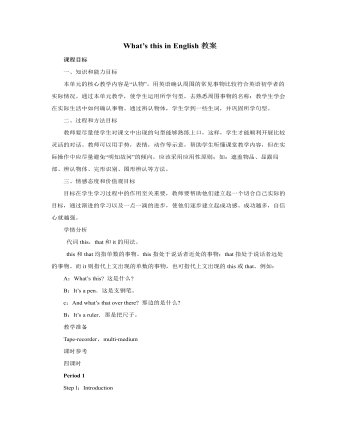
人教版新目标初中英语七年级上册What’s this in English教案
一、知识和能力目标本单元的核心教学内容是“认物”。用英语确认周围的常见事物比较符合英语初学者的实际情况。通过本单元教学,使学生运用所学句型,去熟悉周围事物的名称;教学生学会在实际生活中如何确认事物。通过辨认物体,学生学到一些生词,并巩固所学句型。二、过程和方法目标教师要尽量使学生对课文中出现的句型能够熟练上口,这样,学生才能顺利开展比较灵活的对话。教师可以用手势,表情,动作等示意,帮助学生听懂课堂教学内容,但在实际操作中应尽量避免“明知故问”的倾向,应该采用应用性原则;如:遮盖物品、显露局部、辨认物体、完形识别、图形辨认等方法。三、情感态度和价值观目标目标在学生学习过程中的作用至关重要,教师要帮助他们建立起一个切合自己实际的目标,通过渐进的学习以及一点一滴的进步,使他们逐步建立起成功感。成功越多,自信心就越强。
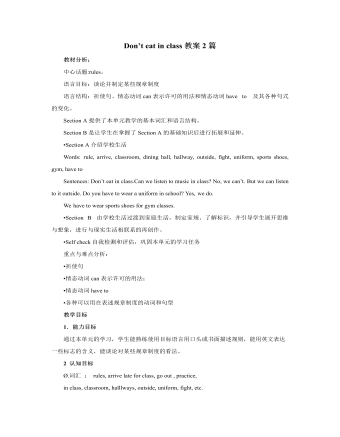
人教版新目标初中英语七年级下册Don’t eat in class教案2篇
Don’t fight. =You can’t fight. (板书,教读)教师把这些句子板书在黑板上,并请学生大声整齐地读祈使句和“can’t”句型,并让学生注意两种句型表达形式的不同和转换,“Don’t …=You can’t…”;并对学生说:These are our school rules. (板书,教读) You can’t break the school rules. Don’t break the school rules.(板书,教读)步骤3 :Practicea. T: Now, each of the students is breaking one of these rules.Please finish 1a.学生看图,完成1a的内容,检查答案并大声朗读校规。b. 听录音,完成1b,选出四位学生都违反了哪条校规;听之前,学生要读会英文名。c. 请两位学生朗读1c部分的句型;要求学生两人一组对话表演,SA扮演外校转来新生,SB告知本校校规。(学生可经过讨论,多说出他们想到的校规,不必只限于书上;教师应给予帮助)2) 第二课时(2a~4)步骤1 :warming up of revisionT: What are the rules at your school?学生使用“can”或祈使句表达各条校规;其中老师可引出“eat in the cafeteria outside”的表达。步骤2 :Practicea.T: Christina is an exchange student. She doesn’t know the rules. Let’s listen, what activities they’re talking about?学生听第一遍时,完成2a;第二遍时,完成2b;b. 请学生领读2c部分,看着2a完成的表格,理解2c活动的要求;分成小组针对2a进行问答;
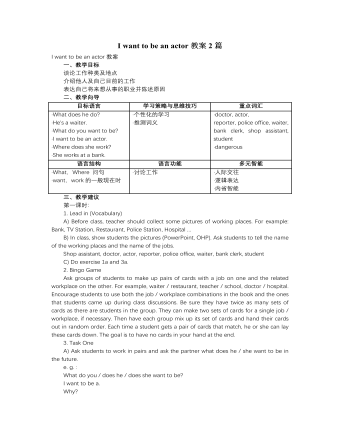
人教版新目标初中英语七年级下册I want to be an actor教案2篇
三、教学建议第一课时:1. Lead in (Vocabulary)A) Before class, teacher should collect some pictures of working places. For example: Bank, TV Station, Restaurant, Police Station, Hospital ...B) In class, show students the pictures (PowerPoint, OHP). Ask students to tell the name of the working places and the name of the jobs.Shop assistant, doctor, actor, reporter, police office, waiter, bank clerk, studentC) Do exercise 1a and 3a.2. Bingo GameAsk groups of students to make up pairs of cards with a job on one and the related workplace on the other. For example, waiter / restaurant, teacher / school, doctor / hospital. Encourage students to use both the job / workplace combinations in the book and the ones that students came up during class discussions. Be sure they have twice as many sets of cards as there are students in the group. They can make two sets of cards for a single job / workplace, if necessary. Then have each group mix up its set of cards and hand their cards out in random order. Each time a student gets a pair of cards that match, he or she can lay these cards down. The goal is to have no cards in your hand at the end.3. Task OneA) Ask students to work in pairs and ask the partner what does he / she want to be in the future.e. g. :What do you / does he / does she want to be?I want to be a.Why?Because it's (adj).B) Vocabulary: Section B, 1a4. Homework 1.2.
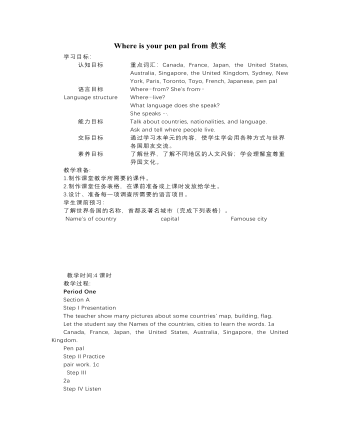
人教版新目标初中英语七年级下册Where is your pen pal from教案
2.1Match the country with the language.Step II Reading3a? let the students read the letter fast and answer the questions.? Let the students ask more questions about the letter as possible as the can.Step III Writing3b.Step IV. Pairwork2cStep V Listening2a, 2bStep V. HomeworkExercises book(1) P3Exercises book (2) P3Period FourStep I . Dictate the words and sentences in Unit1.Step II. Self-checkStep III. Check the answers for Exercises book in the unit.Step IV. Home workRevise and preparation for unit 2.教学反思:通过本单元的学习,学生基本可以谈论人们的国籍,居住城市及其所说的语言,通过书信方式去介绍自己并寻找笔友。但在涉及到国外的一些城市时,学生对这方面的知识相对欠缺,能介绍的城市并不多,也反应出学生课前预习不充分,这跟学生学习条件也有关,大多数学生无法通过网络获取所需信息。因此,在以后的教学中要多指导学生通过计算机网络获取信息,拓宽知识面。
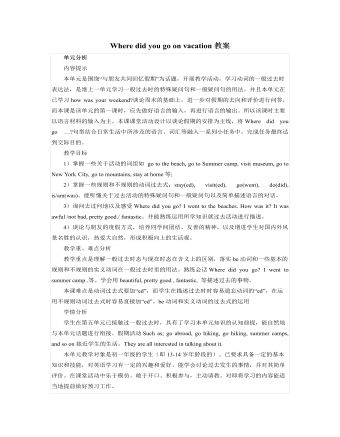
人教版新目标初中英语七年级下册Where did you go on vacation教案
句型: Where did you go on vacation? I went to summer camp.Did she go to Central Park?Yes,she did.No, she didn’t语法:一般过去时特殊疑问句、一般疑问句及肯、否定回答。课时安排4课时第一课时:Section A:la,1b,lc,2a,2b,2c 第二课时:Section A:3a,3b,4第三课时:Section B:1,2a,2b,2c第四课时:Section B:3a,3b,3c,4 and Self Check第一课时教学目标掌握描写假期生活的形容词。假期里自己所做事情的简单表达。谈论假期做的事情及当时情况。谈论假期时旅游的天气,旅游者以及食物等。教学过程一、导入播放一首英文歌曲:Let’s travel 说明:通过让学生听节奏欢快迪斯尼英语歌曲Let’s travel.引入本节课谈论的话题vacation and travel. 让歌曲使学生的思维活跃,增强课堂气氛,激发学生提高学习英语的兴趣。T:How is the trip ?Ss : It’s pretty good/ happy/exciting /relaxing/busy/dangerous/ fantastic说明:这个问题是为了操练形容词。建议让多个Ss作答。鼓励他们用不同的形容词。上述个别形容词本应在第二课时中出现,但可以在warming-up中第一次非正式出现。这些形容词也可在老师的评价语中适时出现,以加深学生对词汇的印象。

人教版新目标初中英语九年级上册Teenagers should be allowed to choose their own clothes教案2篇
Step 1 Greeting Greet the class and check the homeworkStep 2 A duty report The S on duty gives a report on the rules in his home and lead in 3a “Sun Fei’s and Wu Yu’s rules” Step 3 ReadingSs read the conversation and write the two girls’ rules in the chart. Check the answers.Get Ss to read after the tape and then read aloud by themselves. Then, T explains the language points.Step 4 Pairwork 3bRole play. Use the information in chart to practice with the conversation in 3a covered. They can look at the sample conversation in the right box.Step 5 Task 2 “Who’s the best reporter?”Make a survey by asking any 5 students the questions in the chart in activity 4. Then give out a report about it. See who is the best reporter? And the best reporter will get a nice ball-pen.Step 6 Summary and homework:Write out the report in your exercise-books.Period ThreeStep 1 Greeting and a duty reportThe S gives a duty report talking about his experience of being late for school. Lead in the question “Do you ever get to school late? How often do you get to school late? Always, usually, sometimes, or never?Step 2 1a Get Ss to finish writing.Step 3 Pairwork 1b Get Ss to talk about their answers with their partners using the sample conversation in the box on the right.Step 4 Listening practice2a Lead-in: What will happen if you get to school late? What about Peter? Let’s listen to a conversation between Peter and his father. Get Ss to finish 2a (As usual, for the first time, Ss only listen.) Check the answers.

人教版新目标初中英语九年级上册How do you study for a test教案2篇
内容提示本单元主要内容是学会利用verb十by/with gerund表示方式方法来讨论学习英语的策略,认识自己在学习方面的长处和不足。初步了解现在完成时的结构和用法。现在完成时由助动词have/has+动词的过去分词构成,主要表示过去发生的某一动作对现在仍有影响或造成的后果,常与already,yet,just,ever,never等副词连用。教学目标一、学习目标(Language Goal) 1. Talk about how to study . 学会讨论各种学习方法和策略。2. Find out your suitable learning methods. 找出适合自己的学习方法。 二、语言结构(Language Structures) 1. Verb + by with gerund by+动名词短语 表示“通过…途径,方法” 2. How questions have引导的特殊疑问句 三、目标语言(Target Language) 1. How do you study for tests ? 你是怎样准备考试的?Well , I study by working with my classmates. 哦,我和同学们一起学习。2. Have you ever studied with a group ? 你曾经参加过学习小组吗?Yes , I have . I’ve learned a lot that way . 是的,参加过。通过这种方式我学了许多。

人教版新目标初中英语九年级下册Rainy days make me sad教案
1. 教材分析本单元以how do things affect you?为话题, 从颜色、天气、音乐、广告、产品等方面谈论了外界事物如何影响人的心情。要求学生掌握表达某物或某事给人带来的感觉、看法或影响等。共设计了四个部分的内容:Section A 该部分有4个模块:第一模块围绕Which restaurant would you like to go to?这一话题展开思维(1a)、听力(1b)、口语(1c)训练;第二模块围绕How does music affect you? 进行听力(2a-2b)、口语训练(2c);第三模块继续围绕how do colors in the restaurant affect you这一话题展开训练,训练形式为阅读和问题体验(3a)和小组活动(3b);第四模块仍就How do things affect you这一话题以调查的形式展开讨论。Section B该部分有4个模块:第一模块围绕产品广告对人们的影响这一话题以“配对”(1a)与“列举”(1b)两种形式展开训练;第二模块继续围绕How do things affect you? 进行听力(2a-2b)、口语对话训练(2c);第三模块围绕“Advertising”这一话题展开阅读(3a-3b)和写作(3c)训练;第四模块围绕How posters affect you这一话题以口语训练形式展开小组活动。

人教版新目标初中英语九年级下册Could you please tell me where the restrooms are教案
Step Ⅰ RevisionCheck homework. Ask a few students to read the article in 3a.Then ask a few students to read their guides.Step Ⅱ Part 1Look at the words in the box. Ask a student to read them. Make sure the students understand the meaning of the words. You are to fill in the blanks with the words. In some cases, students may need to use another form of the word, for example adjusting for tense or subject/ verb agreement.Ask students to fill in the blanks on their own.Check the answers. Step ⅢPart 2Go through the instructions with the class.Look at the example with the students.Ask students what the answer would be.Ask a student to read the question and answer it.Excuse me, could you tell me where the bank is, please?The bank is across the street from the shopping malt.Get students to complete the work in pairs.Check the answers. Ask a few students to read their questions.Step Ⅳ Just for Fun!Ask all the students to read the conversation. Ask: What is funny about this cartoon? Help students to explain. A Martian is a person from the planet Mars.There is no such thing as Martian food on Earth, and the clerk looks silly because he is trying to think of where there is a Martian restaurant.Invite some pairs of students to present this conversation to the rest of the class.Step Ⅴ Summary and HomeworkIn this class, we’ve done much writing practice using the key vocabulary words and the target language presented in this unit. After class, please finish the questions in 2 in your exercise books. Then finish the exercises on pages 47~48 of the workbook as well.The Seventh Period Ⅰ Teaching Aims and Demands1. Knowledge Objects(1) Key Vocabularyimage, adventure, jealousy, hero, crime, journey, brave, no longer, show interest in, take it easy, become interested in, plain looks(2)Text:Grown-ups like cartoons, too.2. Ability Objects(1) Fast-reading to get a general idea of the text.(2) Careful-reading to get the detailed information in the text.

